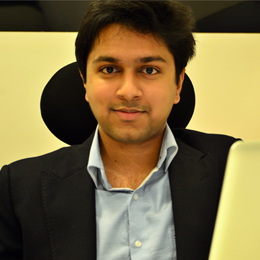Indian cybersecurity startup counts on being street smart, hands on

With the advent of social networks, a lack of security not only threatens businesses but also individuals. This raises the importantance of cybersecurity, especially in creating an awareness and empowerment within various technology and user communities.
That's exactly what Lucideus Tech is doing in India. It is a one-year old Delhi-based startup that helps in providing customized training and security solutions to businesses across the country.
A select group of cyberanalysts and security experts who deliver easy to use security products, training and services customized to keep your Web and networking space protected via workshops and seminars as well as complete solutions to analyze your cybersecurity.

But what makes this startup different is their 22-year-old CEO and co-founder, Saket Modi and his passion towards cybersecurity, besides the interesting story about how this startup came into existence.
Inspiration behind startup
As glamorous as it may sound, the seed to the idea was based on Saket's interest in "reverse engineering" and the excitement it drove for him as a student of computer engineering.
As a college student he tried hacking into his college systems to get to question papers, later on confessing it and telling them how he could use his skill and talent to actually help his college than do harm.
That drove his curiosity over how secure the systems in his college were and how much training students were getting on learning the art of reverse engineering to actually prevent these threats. That's when Lucideus Tech began its journey.
They started off with a few colleges in Jaipur and moved from there to provide solutions to various colleges across the country, IT companies and bigger businesses and enterprises.
What's innovative about Lucideus?
Looking at a bigger picture, training on cybersecurity may seem like a "packaged solution", something that a few other players in the market may also provide.
So I was curious to know if they really were someone who gave more than just theoretical training and reports full of jargon and offer expensive solutions which you may not realize if you need them or not. Turns out, they have a different approach in both places.
Modi tells me that they invested in a solid advisory board, professors from IIT, and few deans and even professionals from Turkey and Finland, who help them out with the latest happenings in the cybersecurity space.
Another thing they stress on is the fact that, their trainings are 80 percent hands on. Unlike the stuff folks learn in engineering colleges, which follow the bookish culture, Modi wants to make his trainings more hands on. They also have secure and dedicated training labs in Delhi where the students learn all about cybersecurity hands on.
He also gave the"'kung-fu" analogy that actually remineds me of the scene from The Matrix. "A person can be a black belt, and say 'I know kung-fu,' however he won't really 'know kung-fu' unless he really tries it."
They have various training modules such as Web security, software security, Wi-Fi hacking where students are encouraged to open the debugger, tweak assembly line codes and actually try out the skills on demo Web sites, systems and mobiles.
On the cybersecurity solutions front, and providing solutions to monitor as well as enhance security solutions within to various companies. They have something called a "WISE" team. The WISE Team (Web Intelligence and Security Experts) are a niche team who have the expertise and deep rooted knowledge of Web intelligence and cybersecurity.
That is what separates them from other players. They hire a team of consultants, who may not be your regular "software engineers" but folks from communities across various cybersecurity and reverse engineering platforms on the Web.
They also comprise of folks who've earned Bachelors in Computer Applications (BCA) from IGNOU (Indira Gandhi National Open University) and have a strong liking toward reverse engineering. But most importantly they are selected based on their hands on knowledge, experience and the passion for cybersecurity--street smart folks who can actually adapt to current scenario and be updated with what's happening in the community.
Generally cybersecurity awareness within India is low as compared to other countries, says Modi. So it's important that his team comprises of the folks who have been there and done that, rather than someone who just has a degree and some know how about concepts and theories.
When asked about the importance of cybersecurity in India, he reiterates that globally there is a huge amount of spending on enhancing cybersecurity and creating awareness overall. There are spendings that amount to over US$21 billion for normal end user on malware solutions and around US$114 billion on enterprise security.
Cybersecurity is the need of the future and with the advent of the Internet becoming more social, this need has become even more important.